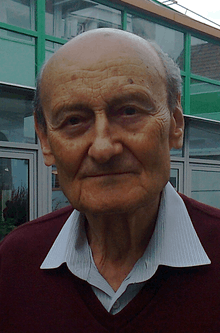Egon Balas
| Egon Balas | |
|---|---|
 | |
| Born |
June 7, 1922 Cluj, Romania |
| Residence | United States |
| Known for | Disjunctive programming |
| Awards | John von Neumann Theory Prize (1995), EURO Gold Medal (2001), Hungarian Academy of Science (external member, 2004), Honorary Doctorate in Mathematics (University of Waterloo, 2005) |
| Scientific career | |
| Fields | Applied Mathematics |
| Institutions | Carnegie Mellon's Tepper School of Business |
Egon Balas (born June 7, 1922 in Cluj, Romania) is an applied mathematician and a professor of industrial administration and applied mathematics at Carnegie Mellon University. Balas is the Thomas Lord Professor of Operations Research at Carnegie Mellon's Tepper School of Business. Balas did some of the fundamental work in developing integer and disjunctive programming.[1]
Life and education
Balas was born in Cluj (Romania) in a Hungarian Jewish family. His original name was Blatt, which was first changed to the Hungarian Balázs and then later to the Romanian Balaş. He is married to art historian Edith Balas, a survivor of Auschwitz, with whom he has two daughters.[2][3] He was imprisoned by the Communist authorities for several years after the war.[4]
He left Romania in 1966 and accepted an appointment with the Carnegie Mellon University in 1967. Balas obtained a "Diploma Licentiate" in economics (Bolyai University, 1949) and Ph.D.s in economics (University of Brussels, 1967) and mathematics (University of Paris, 1968).[5]
Selected publications
- E. Balas, A. Saxena: Optimizing Over the Split Closure, Mathematical Programming 113, 2 (2008), 219–240.
- E. Balas, M. Perregaard: A Precise Correspondence Between Lift-and-Project Cuts, Simple Disjunctive Cuts, and Mixed Integer Gomory Cuts for 0-1 Programming, Mathematical Programming B (94), 2003; 221–245.
- E. Balas, S. Ceria, G. Cornuéjols: Mixed 0-1 Programming by Lift-and-Project in a Branch-and-Cut Framework, Management Science 42, 1996; 1229–1246.
- E. Balas: The Prize Collecting Traveling Salesman Problem: II Polyhedral Results, Networks 25, 1995; 199–216.
- E. Balas, S. Ceria, G. Cornuéjols: A Lift-and-Project Cutting Plane Algorithm for Mixed 0-1 Programs, Mathematical Programming 58, 1993; 295–324.
- E. Balas: The Prize Collecting Traveling Salesman Problem I, Networks 19, 1989; 621–636.
- E. Balas, J. Adams, D. Zawack: The Shifting Bottleneck Procedure for Job Shop Scheduling, Management Science 34, 1988; 391–401.
- E. Balas, V. Chvátal, J. Nesetril: On The Maximum-Weight Clique Problem, Mathematics of Operations Research 12, 1987; 522–536.
- E. Balas: Disjunctive Programming, Annals of Discrete Mathematics 5, 1979; 3–51.
- E. Balas: An Additive Algorithm for Linear Programming in Zero-One Variables, Operations Research 13 (4), 1965; 517–546.
Honors and awards
- National Academy of Engineering, 2006
- IFORS Hall of Fame, 2006
- Honorary Doctorate in Mathematics, University of Waterloo, 2005
- Hungarian Academy of Science, external member, 2004
- INFORMS Fellow, 2002
- Honorary Doctorate in Mathematics, Miguel Hernandez University, Elche, Spain, 2002
- EURO Gold Medal, 2001
- John von Neumann Theory Prize, INFORMS, 1995
- Senior U.S. Scientist Award of the von Humboldt Foundation, 1980–1981
Notes
- ↑
- Graham K. Rand: Egon Balas, Profiles in Operations Research (eds.: A.A. Asad, S.L. Gass), International Series in Operations Research and Management Science, 147, Springer, 2011.
- ↑ University, Carnegie Mellon. "Edith Balas - Center for the Arts in Society - Carnegie Mellon University". www.cmu.edu. Retrieved 8 October 2017.
- ↑ (CMU), Carnegie Mellon University. "March 22: CMU's Edith Balas Pens Memoir Depicting Life as a Survivor and Scholar - Carnegie Mellon University - CMU". www.cmu.edu. Retrieved 8 October 2017.
- ↑ "Holocaust Center of Pittsburgh » Edith Balas". holocaustcenterpgh.org. Retrieved 8 October 2017.
- ↑ E. Balas: Will to Freedom: A Perilous Journey through Fascism and Communism (Syracuse University Press, 2000)
References
- E. Balas: Will to Freedom: A Perilous Journey through Fascism and Communism (Syracuse University Press, 2000) (translated in Hungarian, Romanian, French, Italian, and German).
- E. Balas: Some Thoughts on the Development of Integer Programming During My Research Career, European Journal of Operational Research, 2002, 141 (1) pp. 1–7.
Further reading
- Graham K. Rand: Egon Balas, Profiles in Operations Research (eds.: A.A. Asad, S.L. Gass), International Series in Operations Research and Management Science, 147, Springer, 2011.
External links
- Official website
- Biography of Egon Balas from the Institute for Operations Research and the Management Sciences